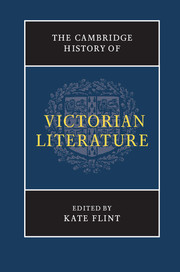Book contents
- Frontmatter
- Introduction
- PART I AUTHORS, READERS, AND PUBLISHERS
- PART II WRITING VICTORIA’s ENGLAND
- PART III MODES OF WRITING
- PART IV MATTERS OF DEBATE
- 15 Education
- 16 Spirituality
- 17 Material
- 18 Economics and finance
- 19 History
- 20 Sexuality
- 21 Aesthetics
- 22 Science and literature
- 23 Subjectivity, psychology, and the imagination
- 24 Cityscapes
- 25 The rural scene: Victorian literature and the natural world
- 26 ‘The annihilation of space and time’: literature and technology
- PART V SPACES OF WRITING
- PART VI VICTORIAN AFTERLIVES
- Select bibliography
- Index
19 - History
from PART IV - MATTERS OF DEBATE
Published online by Cambridge University Press: 28 March 2012
- Frontmatter
- Introduction
- PART I AUTHORS, READERS, AND PUBLISHERS
- PART II WRITING VICTORIA’s ENGLAND
- PART III MODES OF WRITING
- PART IV MATTERS OF DEBATE
- 15 Education
- 16 Spirituality
- 17 Material
- 18 Economics and finance
- 19 History
- 20 Sexuality
- 21 Aesthetics
- 22 Science and literature
- 23 Subjectivity, psychology, and the imagination
- 24 Cityscapes
- 25 The rural scene: Victorian literature and the natural world
- 26 ‘The annihilation of space and time’: literature and technology
- PART V SPACES OF WRITING
- PART VI VICTORIAN AFTERLIVES
- Select bibliography
- Index
Summary
The first Victorian generation witnessed what many of them recognized as unprecedented change in the physical and political world about them. It was a sentiment famously described by Thackeray in his ‘Roundabout Paper’ of October 1860 entitled De Juventute. For Thackeray, the coming of the railways in the 1830s seemed to demarcate one age from another and not just his own youth from his middle age:
We who have lived before the railways were made to belong to another world. In how many hours could the Prince of Wales drive from London to Brighton, with a light carriage built expressly, and relays of horses longing to gallop the next stage? … It was only yesterday, but what a gulf between now and then! Then it was the old world. Stage-coaches, more or less swift, riding-horses, pack-horses, highwaymen, knights in armour, Norman invaders, Roman legions. Druids, Ancient Britons painted blue, and so forth – all these belong to the old period. I will concede a halt in the midst of it, and allow that gunpowder and printing tended to modernise the world. But your railroad starts a new era, and we of a certain age belong to the new time and the old one. We are of the time of chivalry as well as the Black Prince or Sir Walter Manny. We are of the age of steam.
- Type
- Chapter
- Information
- The Cambridge History of Victorian Literature , pp. 405 - 421Publisher: Cambridge University PressPrint publication year: 2012
- 1
- Cited by

